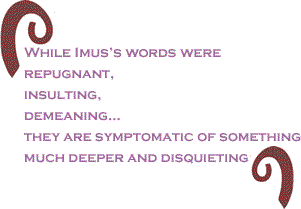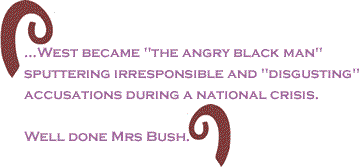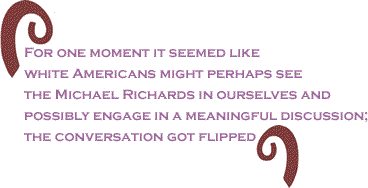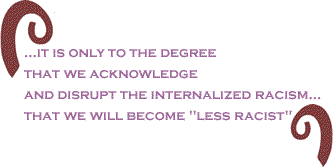
|
|||||||||||||||||||||
|
The current issue is always free to all readers If
you need the access available to a |
|
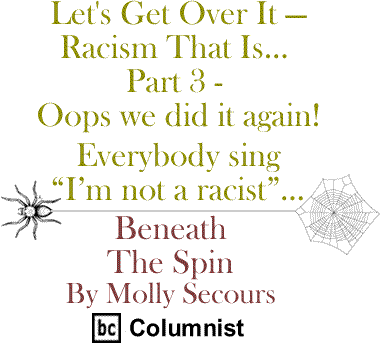 |
|
In the past 18 months, we have had several major opportunities to engage in a meaningful national dialogue on race. And each time it has taken exactly 5.3 seconds before the conversation is deflected and blame is laid elsewhere - usually on Black people themselves. If we look at the public outbursts of Kanye West, Michael Richards and, most recently, Don Imus, we will recognize a similar pattern of deflection and denial. All three were squandered opportunities in which words unleashed could have inspired us to turn inward and honestly reflect on how racism lives inside of us and is reflected. And most importantly how these words manifest systemically - where the real damage lies. Instead of trying to isolate and demonize Don Imus for a supposed ‘slip of the tongue,' how about examining the myriad ways in which Black women - and all people of color - experience being treated like ‘nappy headed hos’ in education, health care, employment and criminal justice? While Imus’s words were repugnant, insulting, demeaning - and the list goes on - they are symptomatic of something much deeper and disquieting. For a few moments last week, verbal champagne was sprayed over the airwaves, celebrating victory. Whites and non-whites rejoiced that a powerful, entitled white male, was at last challenged and held accountable for degrading and demeaning speech against young women of color. And initially, it seemed there was consensus that these weren't just words of attempted humor gone awry, they were indictments on women, specifically African American woman, that historically have been dismissed with the explanation “I was just being funny.”
It was like setting your watch to ole' faithful for the moment that Imus, like Michael Richards issued the predictable and hollow defense: “But I’m not a racist” as if there were any doubt that these words could have been uttered by anyone who was not racist. And again, as if it were even possible to be white and not be racist. And yet this “but I’m not a racist” caveat is our first line of defense. Always. The second line of defense, after denying culpability, is deflecting responsibility and placing blame elsewhere - thereby eliminating the prospect of an honest discussion. What a perfect opportunity to blame the voraciousness of Rev’s Al Sharpton and Jesse Jackson for pouncing on the words of a white radio personality while the real culprits escape unscathed: And like magic, Don Imus begins to recede into the shadows so that the real culprits may be devoured by the pundits: Black rappers and hip hop artists. And now African American rappers - victims of white supremacy themselves - who are rewarded handsomely for misogynistic and degrading portrayals of Black women in videos are to blame for Imus’s remarks. That it is predominantly white recording companies who perpetuate these artists, while ignoring multitudes of other artists who are not supplying them with thuggish portrayals of Black culture, does not seem to be of concern. That 80% of the consumers for gangsta rap are white kids from the suburbs, does not seem worthy of note. How long will it take before we extract our collective heads from the sand and recognize that white supremacy is rooted in economics. There are no studies of health care, education, employment and criminal justice that do not reflect that people of color are disproportionately (and negatively) represented in the lower margins of all these areas which measure economic, social and physical well being.
The words spoken by Imus are but a symptom of the collective racism that permeates daily life in America. Economics has always played the starring role in racism/white supremacy, which is why, when mega dollars are involved, grandiose gestures of conscience will be made. When Imus’s sponsors began to pullout, it was time to issue a public gesture of contrition. Not before. And NBC, to their credit did fire Imus, but only after the dollars started disappearing. Ironically, just eighteen months ago, when Kanye West stated on NBC that “George Bush doesn’t care about Black people” during a televised benefit for the victims of Katrina, West's comments were cut from the west coast feed - as if he had uttered an obscenity. West did not call the president’s daughter a ho, or insult him. West simply made a statement that was packed with emotion and based on his observations of the Bush’s policies in addressing the disaster - not to mention the current policies of the administration which reflects major cuts for programs benefiting minorities. Within 48 hours after West’s statements, First Lady Laura Bush denounced all critics who say race played a role in the federal government's slow response to victims of Hurricane Katrina, calling the accusations "disgusting." Rather than inviting West to the White House and engage him in a meaningful discussion about race and inquire about what inspired him to make such a strong and passionate statement on national television, she chose to make him the villain. The media followed suit and West became "the angry Black man" sputtering irresponsible and "disgusting" accusations during a national crisis. Well done Mrs Bush.
Within a span of two weeks, former Secretary of Education under Ronald Reagan and drug czar under George Bush senior, William Bennett vehemently denied he is racist. On his radio show, Bill Bennett's Morning in America, Bennett stated, "You could abort every Black baby in this country, and your crime rate would go down. Although he followed it up by saying "That would be an impossible, ridiculous and morally reprehensible thing to do, but your crime rate would go down”. Unlike his wife’s almost immediate rebuttal to Kanye West’s comments in which he was called ‘disgusting’, it took several weeks after the firestorm for the president to issue a statement simply stating that he “believes the comments were not appropriate." And then there was Michael Richards' verbal assault on African American hecklers during a comedy routine which resulted in a national gasp of horror, wherein he lost bookings and was publicly scorned. For one moment it seemed like white Americans might perhaps see the Michael Richards in ourselves and possibly engage in a meaningful discussion; the conversation got flipped. As luck would have it the defense and the "real" issue became Black comedians themselves and their use of the “N” word. And once again, rather than reflect inward, we pointed outside ourselves and identified the real culprit: Black people. And once again, the airwaves were filled with numerous pundits, including African American experts, who are more than willing to redirect the discussion where it apparently will stay (for now): outside of white America. Why is it so difficult to admit to the Don Imus that lives within each of us? At what point will we stop pointing the finger "over there" and accept that if one is white, and raised in this culture, that it is impossible not to be racist? When will we understand that it is only to the degree that we acknowledge and disrupt the internalized racism - which resides in all whites - that we will become "less racist". It is only after we become adept at disrupting internalized racism, that we can tackle the more difficult task of addressing systemic injustices that effect people of color - even when some loud mouth talk show host isn’t spewing invectives on the national airwaves. And it is possible that Don Imus - and those of us who who admit to the 'inner Imus ' - just might actually become less racist as a result of this public debacle. But only if we resist the temptation to point elsewhere and face that there is no "there" over there. When it comes to systemic racism and the relentless perpetuation of white supremacy, denial and deflection are dynamite in the proximity of fire. It is only a matter of time before they ignite. Ms. Secours new documentary film "College On the Brain" (When your realize that your dreams are the dreams of your community you can't just beat the odds... You have to change them) premieres at the Nashville Film Festival this week and next - Friday, April 20 at 4:30pm and Tuesday, April 24 at 4pm at the Green Hills Cinema. Click here to read any of the parts of this series of commentaries. BC Columnist Molly Secours is a Nashville writer/filmmaker/speaker host of her Beneath The Spin radio program at 88.1 WFSK at Fisk. Her websites are mollysecours.com and myspace.com/mollysecours. Click here to contact Ms. Secours. |
|
| Home | |
| April
19, 2007 Issue 226 |
||||||||||||||
|
||||||||||||||
| Printer Friendly Version in resizeable plain text format | ||||||||||||||
 |
||||||||||||||
|
||||||||||||||
 |
||||||||||||||
 |
||||||||||||||
 |
||||||||||||||
| |
||||||||||||||
| |
||||||||||||||






















